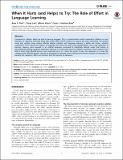When It Hurts (and Helps) to Try: The Role of Effort in Language Learning
Author(s)
Finn, Amy Sue; Lee, Taraz; Kraus, Allison; Hudson Kam, Carla L.
DownloadFinn-2014-When It Hurts (and H.pdf (792.6Kb)
PUBLISHER_CC
Publisher with Creative Commons License
Creative Commons Attribution
Terms of use
Metadata
Show full item recordAbstract
Compared to children, adults are bad at learning language. This is counterintuitive; adults outperform children on most measures of cognition, especially those that involve effort (which continue to mature into early adulthood). The present study asks whether these mature effortful abilities interfere with language learning in adults and further, whether interference occurs equally for aspects of language that adults are good (word-segmentation) versus bad (grammar) at learning. Learners were exposed to an artificial language comprised of statistically defined words that belong to phonologically defined categories (grammar). Exposure occurred under passive or effortful conditions. Passive learners were told to listen while effortful learners were instructed to try to 1) learn the words, 2) learn the categories, or 3) learn the category-order. Effortful learners showed an advantage for learning words while passive learners showed an advantage for learning the categories. Effort can therefore hurt the learning of categories.
Date issued
2014-07Department
Massachusetts Institute of Technology. Department of Brain and Cognitive Sciences; McGovern Institute for Brain Research at MITJournal
PLoS ONE
Publisher
Public Library of Science
Citation
Finn, Amy S., Taraz Lee, Allison Kraus, and Carla L. Hudson Kam. “When It Hurts (and Helps) to Try: The Role of Effort in Language Learning.” Edited by Antoni Rodriguez-Fornells. PLoS ONE 9, no. 7 (July 21, 2014): e101806.
Version: Final published version
ISSN
1932-6203